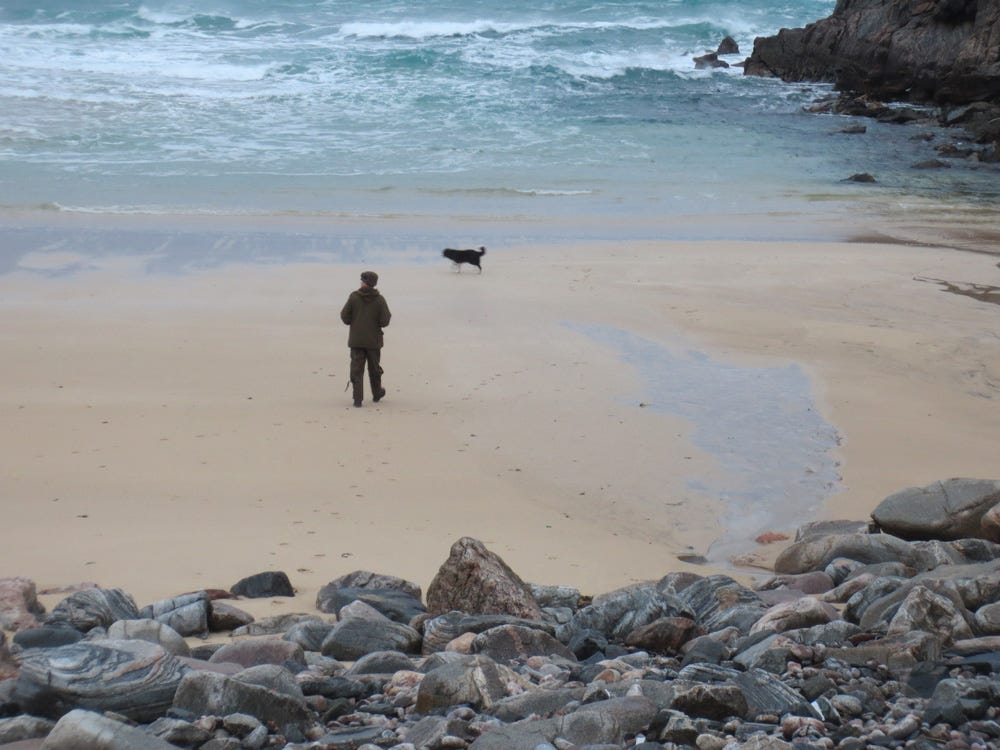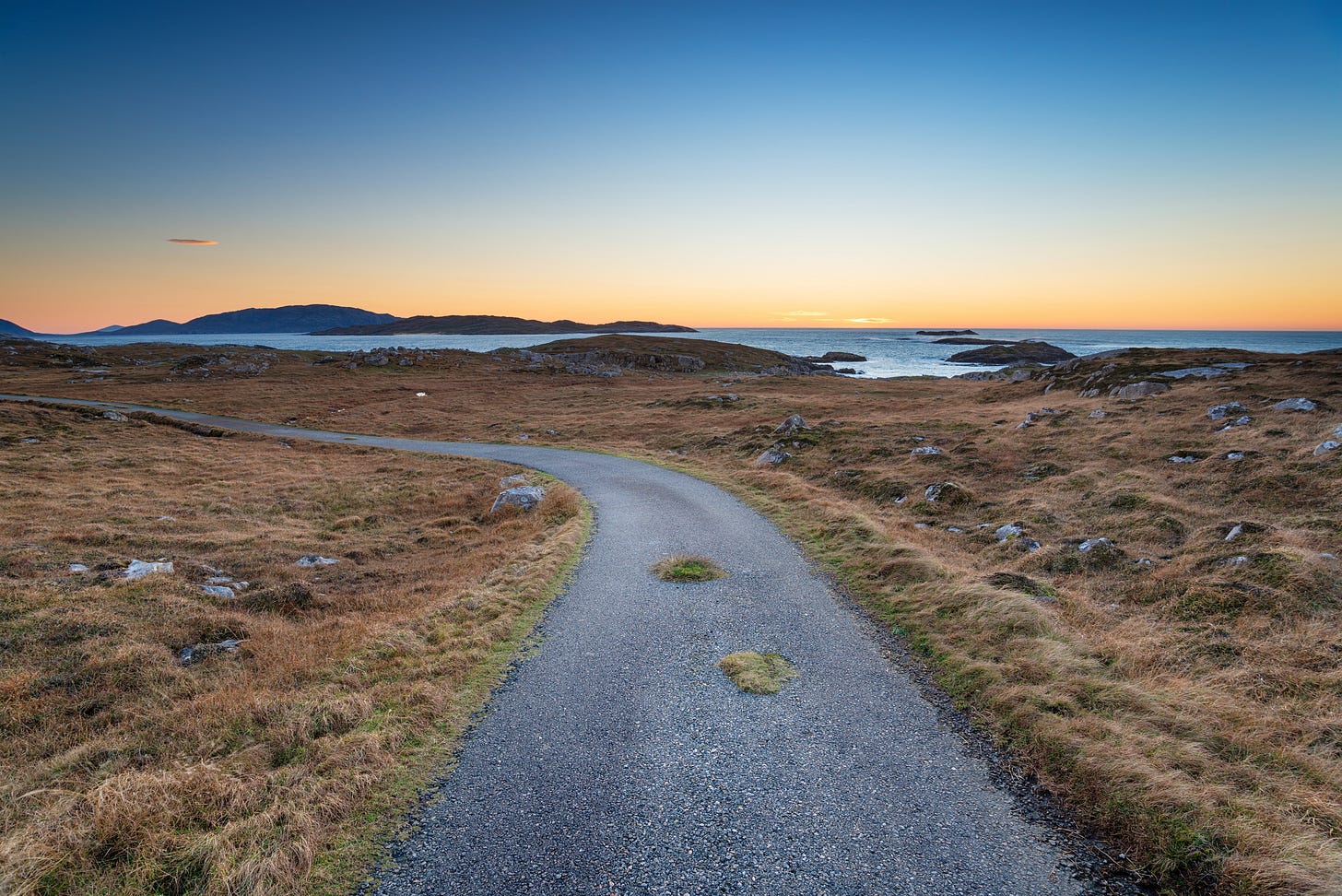Severance
Riverwitch #1
‘Riverwitch’ is a collaborative project with my husband David Knowles, author of Elvers by Moonlight. It’s the re-membering of a blog duet we began in 2014, mapping our dislocation from the Isle of Lewis in the Outer Hebrides to Donegal in north-west Ireland. It offers a story-within-a-story as, ten years on, we try to make sense of the ways in which places claim us, mark us – and then, when it’s time, cast us loose. We take turns every Wednesday to revisit an old post and add new reflections and insights. For the background to this project, please read this post first.
The audio version of my posts is below the paywall, for paid subscribers.
Severance
January 2014
If you have ever driven the road through the district of Uig to the farthest south-western corner of the Isle of Lewis in the Outer Hebrides – the road once described as the longest cul-de-sac in Europe – you’ll know Mangurstadh Beach. It sits almost out of sight, well below the tarmac, just as you reach the top of that rise, three miles or so before the road finally abandons its attempt to go south, a little beyond Breanish. You’ll recall the rise, where the road you have been confidently riding falls away from you like a breaking wave – I’d bet you’ll never forget it – the place where you suddenly fall forward into the open jaw of the Atlantic, where the sea and the sky rise up to ambush you. Just there, when you think that you are going to pitch headlong into so much space and distance, Mangurstadh Beach is waiting to catch you. If you allow yourself to be ensnared by its curving white sands and the bright turquoise and emerald green of the shallows, you’ll forever be a haunter-of-edges. If you don’t watch yourself you’ll turn to stone down on that beach, a sea-smoothed rock-creature with eyes that are holes where the sky shines through.
Sometimes you do not sever yourself from a land you have loved by holding yourself back from it. Sometimes you can only sever yourself by giving it everything you have left, more than you are sure you can bear to risk. In the early days of this year, as our departure becomes real, I circle around the loved places, the places to which I have already given more of myself than was safe to risk. And I love all the more, and so risk all the more. Isn’t the loving and the risking, after all, the essence of what it is to be alive? That act of loving is both an act of giving and an act of committing – not least, of committing to memory.
It is also an act of worship, and so it is that we have fashioned a Sunday morning ritual: we walk out to the places we haven’t been yet, the places we pass each day on the road, where so often we have said, ‘Oh, we must go down there sometime . . .’ But of course we did not, because there has always been another pig-shed to muck out, another seed tray of fledgling vegetables to cherish. We stand in these familiarly unfamiliar places knowing that we will never know them fully now, nor they us. But we bow our heads to a rock and turn into the face of a wave; we let the wind carry us and we do not in this way ease the pain of our leaving, but rather participate in it. We choose not to simply fade from this place like ghosts; even in our passing we continue to try to bear witness to it.
This morning’s church was Mangurstadh beach, and as I stood back above the rocks and watched David down by the shoreline with the dogs, I was reminded of a poem by our friend John Glenday:
Manghurstadh
I send you the hush and founder
of the waves at Manghurstadh
in case there is too much
darkness in you now
and you need to remember
why it is we love
(John Glenday, from Grain, 2009)
Mangurstadh Beach
Ten years on, I find that I’ve left too many places that I’ve loved; each time I wonder if I still have it in me now to properly commit to another. Maybe the accumulated leavings have shattered my heart; I don’t know. What I do know is that I have never recovered from leaving Lewis and that, I suspect, is where the problem really lies. I think it’s why I’ve come running for home after all these years – back to the far north of England, back to the wild borderlands of my birth and my ancestry. A place I fit into in a different way. A place that can never be ripped out of my heart, that will always be mine.
The island lives on in my imagination, though, and haunts me like no other place has or could. It’s scattered throughout my reimagined fairy tales in Foxfire, Wolfskin: trout-wife, the water-horse as lover, skin-slipping selkies, the mythic Old Woman who has lived too long and finally breaks over the dead body of a fox. It lives on in my memory, vivid as ever: dancing barefoot at the Rocky Place; ‘The Seal-Woman’s Sea-Joy’ sung to a howling seal in the early morning bay. And the memory of that Sunday morning at Mangurstadh beach retains the shape of a hole in me that I’ve never since been able to fill. Maybe for each of us there’s one Great Love that we never get over, that we never quite manage to forget.
I can still ride the breaking waves of the then-little-travelled road to Breanish in my mind. They’ll kill it in the end, though; they always do. Here’s how – and here’s where. Drive on for another four miles beyond Mangurstadh where, as if losing heart, overwhelmed by so much wildness and beauty, the road gradually peters out into bare stone mountains on the border between Lewis and Harris. It ends at another white-sanded beach in the abandoned village of Mealista, one of many casualties of the Clearances. On this remote section of the coast the prevailing gales are so strong that every few winters an especially violent storm will blow all the sand off the beach. After a year or two it creeps back, slowly, as if hoping that the wind won’t notice. The heart gives out along with the road there on the edge of the world. And my heart will give out for sure on the day that the proposed massive fish farm begins to be built into the side of a mountain at beautiful, wild, deserted Mealista. A farm that will produce 90,000 tonnes of farmed salmon each year and, according to the Stornoway Gazette, will involve 224 fish tanks, each 22 metres wide, linked to the seawater by a network of pipes.
What the heart can bear. What the heart holds. But the heart must hold, because that’s where the unviolated Mealista will live on. I hold Mangurstadh in my heart, and I hold Mealista. I hold Mealaisbhal and Cracabhail; I hold the headland and the lochside. I wonder sometimes if they still hold me.
Sharon
The road to Mealista





